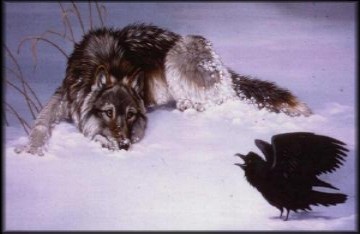 The Origin of Light
The Origin of Light
Native American Lore
In the early times, there was only darkness; there
was no light at all. At the edge of
the sea a woman lived with her father. One time
she went out to get some water. As
she was scraping the snow, she saw a feather floating
toward her. She opened her
mouth and the feather floated in and she swallowed
it. From that time she was
pregnant.
Then she had a baby. It's mouth was a raven's bill.
The woman tried hard to find
toys for her child. In her father's house was hanging
a bladder that was blown up.
This belonged to the woman's father. Now the baby,
whose name was tulugaak
(Raven), pointed at it and cried for it. The woman
did not wish to give it to him but
he cried and cried. At last she gave in and took
the bladder down from the wall and
let the baby play with it. But in playing with it,
he broke it. Immediately, it began to
get light. Now there was light in the world, and
darkness, too.
When the woman's father came home, he scolded his
daughter for taking the
bladder down from the wall and giving it to the
child. And when it was light,
tulugaak had disappeared.



Ravens Great Adventure
Native American Lore
The Innu carve strange and beautiful figures, representing
people, animals, birds,
fish, and supernatural characters, then paint them
with bright colors. The tallest
red cedar trees are selected for totem poles, and
are used for landmarks as well as
illustrating the legends told from generation to
generation.
On one of these poles was carved a stunning Raven,
but he had no beak!
The Raven in Alaska was no ordinary bird. He had
remarkable powers and could
change into whatever form he wished. He could change
from a bird to a man, and
could not only fly and walk, but could swim underwater
as fast as any fish.
One day, Raven took the form of a little, bent over
old man to walk through a
forest. He wore a long white beard and walked slowly.
After a while, Raven felt
hungry. As he thought about this, he came to the
edge of the forest near a village on
the beach. There, many people were fishing for halibut.
In a flash, Raven thought of a scheme. He dived into
the sea and swam to the spot
where the fishermen dangled their hooks. Raven gobbled
their bait, swimming from
one hook to another. Each time Raven stole bait,
the fishermen felt a tug on their
lines. When the lines were pulled in, there was
neither fish nor bait.
But Raven worked his trick once too often. When Houskana,
an expert fisherman,
felt a tug, he jerked his line quickly, hooking
something heavy. Raven's jaw had
caught on the hook! While Houskana tugged on his
line, Raven pulled in the
opposite direction. Then Raven grabbed hold of some
rocks at the bottom of the
sea and called, "O rocks, please help me!" But the
rocks paid no attention.
Because of his great pain, Raven said to his jaw,
"Break off, O jaw, for I am too
tired." His jaw obeyed, and it broke off.
Houskana pulled in his line immediately. On his hook
was a man's jaw with a long
white beard ! It looked horrible enough to scare
anyone. Houskana and the other
fishermen were very frightened, because they thought
the jaw might belong to some
evil spirit. They picked up their feet and ran as
fast as they could to the chief's
house.
Raven came out of the water and followed the fishermen.
Though he was in great
pain for lack of his jaw, no one noticed anything
wrong because he covered the
lower part of his face with his blanket.
The chief and the people examined the jaw that was
hanging on the halibut hook. It
was handed from one to another, and finally to Raven
who said, "Oh, this is a
wonder to behold!" as he threw back his blanket
and replaced his jaw.
Raven performed his magic so quickly that no one
had time to see what was
happening. As soon as Raven's jaw was firmly in
place again, he turned himself into
a bird and flew out through the smoke hole of the
chief's house. Only then did the
people begin to realize it was the trickster Raven
who had stolen their bait and
been hooked on Houskana's fishing line.
On the totem pole, Raven was carved, not as the old
man, but as himself without his
beak, a reminder of how the old man lost his jaw.



|